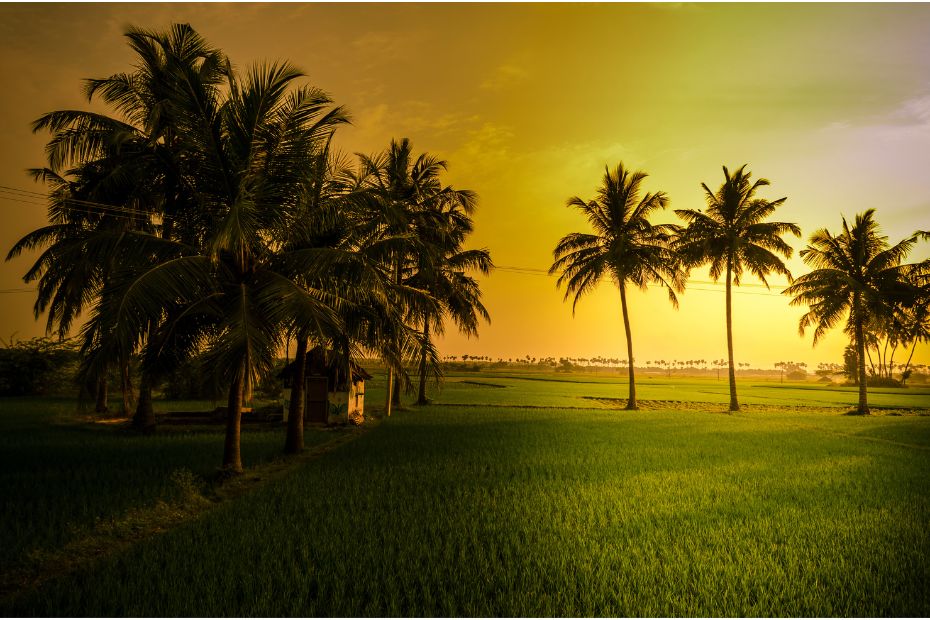Agritourism in India is an amusing way to experience the country’s rich cultural heritage. You’ll spot stunning landscapes and delicious farm-to-table dining. On the journey through rural India, you’ll discover the charm of traditional villages. Engage in sustainable travel. Above all, enrich your learning about Indian agriculture.
Agritourism is growing significance in India. It provides a unique opportunity to explore hidden gems, connects with nature, and immerse yourself in the warm hospitality of local communities. Embark on an unforgettable adventure.
Top Agritourism Destinations in India: Discovering the Best Farmstays
Countless Indian farmstays are scattered across the country, each offering a distinct experience. Here are four must-visit destinations for your agritourism adventure:
- Coorg, Karnataka: Nestled amid lush coffee plantations, Coorg boasts aromatic spice farms and breathtaking views of the Western Ghats. Enjoy guided plantation walks and sample delicious homemade Kodava cuisine.
- Panchgani, Maharashtra: Surrounded by strawberry fields and lush green valleys, Panchgani is a haven for fruit enthusiasts. Visit during the annual Strawberry Festival to relish fresh berries straight from the farm.
- Kodaikanal, Tamil Nadu: With its verdant organic farms and cool climate, Kodaikanal is perfect for those seeking tranquility. Participate in cheese-making workshops and explore the serene countryside on horseback.
- Palampur, Himachal Pradesh: Set against the backdrop of the majestic Dhauladhar Range, Palampur’s tea estates and picturesque villages offer a rejuvenating retreat. Learn about tea production and try your hand at pottery.
Experiencing Organic Farming: Sustainable Practices Across India
Organic farming in India is gaining momentum as more farmers adopt eco-friendly methods to grow their produce. By visiting an organic farm, you’ll witness firsthand how farmers use natural techniques to nurture their crops, like vermicomposting and intercropping.
For example, the Navdanya Biodiversity Farm in Uttarakhand is a pioneer in organic farming and seed conservation. Here, you can attend workshops on sustainable agriculture and sample mouthwatering organic dishes.
Traditional Indian Agriculture: A Deep Dive into Indigenous Farming Techniques
Indian agriculture is steeped in centuries-old traditions passed down through generations. As you explore rural India, you’ll learn about unique farming practices, such as:
- SRI (System of Rice Intensification): An innovative method to increase rice yields using less water and seeds. Farmers in Tamil Nadu and Andhra Pradesh have successfully adopted this technique.
- ZBNF (Zero Budget Natural Farming): A chemical-free approach to farming that relies on natural resources and minimizes input costs. Popularized by Subhash Palekar, ZBNF is practiced in various parts of India.
- Phad irrigation: An ancient water management system farmers use in Maharashtra’s arid regions. The procedure involves the construction of stone bunds and canals to conserve and distribute water.
Farm-to-Table Dining: Savoring India’s Authentic Flavors
Farm-to-table dining in India is a gastronomic delight. Enjoy meals made from fresh, locally-sourced ingredients that showcase the diverse flavors of the country. At most farm stays, you’ll be treated to traditional, home-cooked dishes prepared with love by local families.
From millet-based delicacies in Rajasthan to delectable fish curries in Kerala, the culinary journey through rural India is as enriching as it is delicious. Don’t miss the opportunity to learn about regional cuisines and even participate in cooking classes.
Participatory Agriculture: Engaging in Hands-On Farm Activities
Agritourism in India isn’t just about sightseeing; it’s also about getting your hands dirty! Participatory agriculture allows you to dive into the daily life of farmers and experience a range of hands-on activities. Depending on the season and location, you might find yourself:
- Plucking tea leaves in Darjeeling
- Harvesting rice paddies in Kerala
- Picking apples in Himachal Pradesh
- Planting saplings in a Tamil Nadu nursery
These activities offer a deeper understanding of the hard work that goes into Indian agriculture and foster a connection with the land and its people.
Wildlife and Nature Conservation: Agritourism’s Role in Protecting Biodiversity
Agritourism plays a crucial role in promoting wildlife and nature conservation. Many farmstays double as sanctuaries for native flora and fauna, offering travelers the chance to learn about various conservation efforts.
For example, the SaveAGram initiative in Garhwal, Uttarakhand, focuses on preserving local ecosystems and traditional farming practices. By staying in eco-friendly accommodations, you’ll contribute to preserving the region’s rich biodiversity.
Rural Handicrafts and Artisans: The Creative Side of Agritourism
Traveling through rural India, you’ll be amazed by the wealth of artistic talent hidden in its villages. Agritourism provides a platform for local artisans to showcase their skills, be it pottery, weaving, or painting. By purchasing their creations, you’ll support the local economy and preserve India’s cultural heritage.
For example, the village of Raghurajpur in Odisha is renowned for its exquisite Pattachitra paintings. The weavers of Kutch, Gujarat, create intricate textiles that are sought after worldwide.
Cultural Immersion: Festivals and Traditions in Rural India
Agritourism is a gateway to experiencing rural India’s vibrant festivals and customs. Participating in local events will give you a deeper appreciation for the region’s traditions and connect with the community. Some unforgettable experiences include:
- Holi, the festival of colors, celebrated across North India
- Pongal, the harvest festival, observed in Tamil Nadu
- Bihu, a series of three agricultural festivals, celebrated in Assam
Eco-friendly Accommodations: Green Living in Indian Farmhouses
Eco-friendly accommodations in India are designed to minimize their impact on the environment. From solar-powered cottages to mud-brick huts, you’ll find various sustainable options that blend seamlessly with nature.
For example, the Bison Resort in Kabini, Karnataka, offers luxurious tents with solar-heated water and a strong focus on water conservation, ensuring a guilt-free stay for eco-conscious travelers.
Planning Your Agritourism Trip: Tips and Tricks for a Memorable Experience
Now that you’re ready to embark on your agritourism adventure, here are a few tips to make your experience unforgettable:
- Choose your destination based on the season and activities you’d like to participate in
- Research farm stays and eco-friendly accommodations that align with your preferences
- Dress appropriately for outdoor activities and respect local customs
- Immerse yourself in the local culture, be open to new experiences, and make lasting connections with the community
With these tips in mind, you’re all set to explore India’s captivating world of agritourism. Happy travels!
Pandurang Taware: The Inspiring Journey of India’s Father of Agritourism
Pandurang Taware lived in Malegaon in Maharashtra, India. He was an ordinary farmer. Unlike others, Pandurang had a dream: to share the beauty of rural life with city dwellers.
Despite doubts from fellow villagers, Pandurang persevered. He transformed his farm into a welcoming space, offering visitors a taste of farming life. He transformed his farm into an agritourism destination, providing comfortable accommodations and engaging in farming activities. As word spread, more people visited his farm, and the villagers’ skepticism waned.
Pandurang’s vision inspired other farmers to embrace agritourism, and he is known as the Father of Agri Tourism in India. His determination changed perceptions of rural life, benefiting farmers and tourists. It encouraged a deeper connection with nature and sustainable living.
Frequently Asked Questions (FAQs): Agritourism in India
What is agritourism?
Agritourism is a form of sustainable tourism that focuses on rural experiences, allowing visitors to engage in farming activities, learn about local agricultural practices, and immerse themselves in rural culture and traditions.
What can I expect from an agritourism experience in India?
During your agritourism trip, you can expect to participate in farming activities, explore picturesque landscapes, enjoy farm-to-table dining, interact with local communities, and learn about traditional Indian agriculture and handicrafts.
Where can I find agritourism destinations in India?
There are numerous agritourism destinations spread across India. Some popular locations include Coorg (Karnataka), Panchgani (Maharashtra), Kodaikanal (Tamil Nadu), and Palampur (Himachal Pradesh).
What types of accommodations are available at agritourism destinations in India?
Agritourism accommodations range from simple homestays and farmhouses to eco-friendly cottages and luxury resorts. These lodgings typically prioritize sustainability and provide a comfortable, immersive experience.
Is agritourism suitable for families and children?
Yes, agritourism suits all age groups, including families and children. Many agritourism destinations offer kid-friendly activities and opportunities for learning about agriculture and rural life in a fun, interactive way.
What is the best time of year to visit agritourism destinations in India?
The ideal time to visit agritourism destinations in India varies depending on the region and the specific activities you wish to engage in. Generally, the cooler months from October to March are the most comfortable for outdoor activities.
How can I support local communities during my agritourism trip?
By participating in agritourism, you’re already supporting local communities. To further contribute, you can purchase locally-made handicrafts, engage in cultural exchange, and choose eco-friendly accommodations prioritizing sustainability and community involvement.
What should I pack for an agritourism trip in India?
When packing for an agritourism trip, consider including comfortable clothing suitable for outdoor activities, a hat, sunscreen, insect repellent, sturdy shoes, and any necessary personal items. Also, be prepared to respect local customs and dress codes.
Are agritourism destinations in India accessible for people with disabilities?
Accessibility varies depending on the destination. Some agritourism locations may offer accessible accommodations and facilities, while others may not. Researching and communicating with your chosen destination is essential to ensure they can meet your accessibility needs.
Can I participate in agritourism activities even if I have no prior farming experience?
Absolutely! Agritourism activities are designed to accommodate people with varying experience levels, including beginners. Local guides and hosts will provide the necessary guidance and support to help you learn and enjoy your agritourism experience.
Summary
In conclusion, agritourism in India offers a unique and enriching experience for travelers seeking to explore the country’s rural charm. From engaging in hands-on farming activities to discovering local handicrafts and traditions, agritourism immerses visitors in India’s rich agricultural heritage. By choosing eco-friendly accommodations and supporting local communities, travelers can contribute to sustainable tourism and help preserve India’s natural beauty and cultural legacy. So, pack your bags and get ready to join a memorable adventure that will deepen your connection with the land, its people, and yourself. Happy travels!



